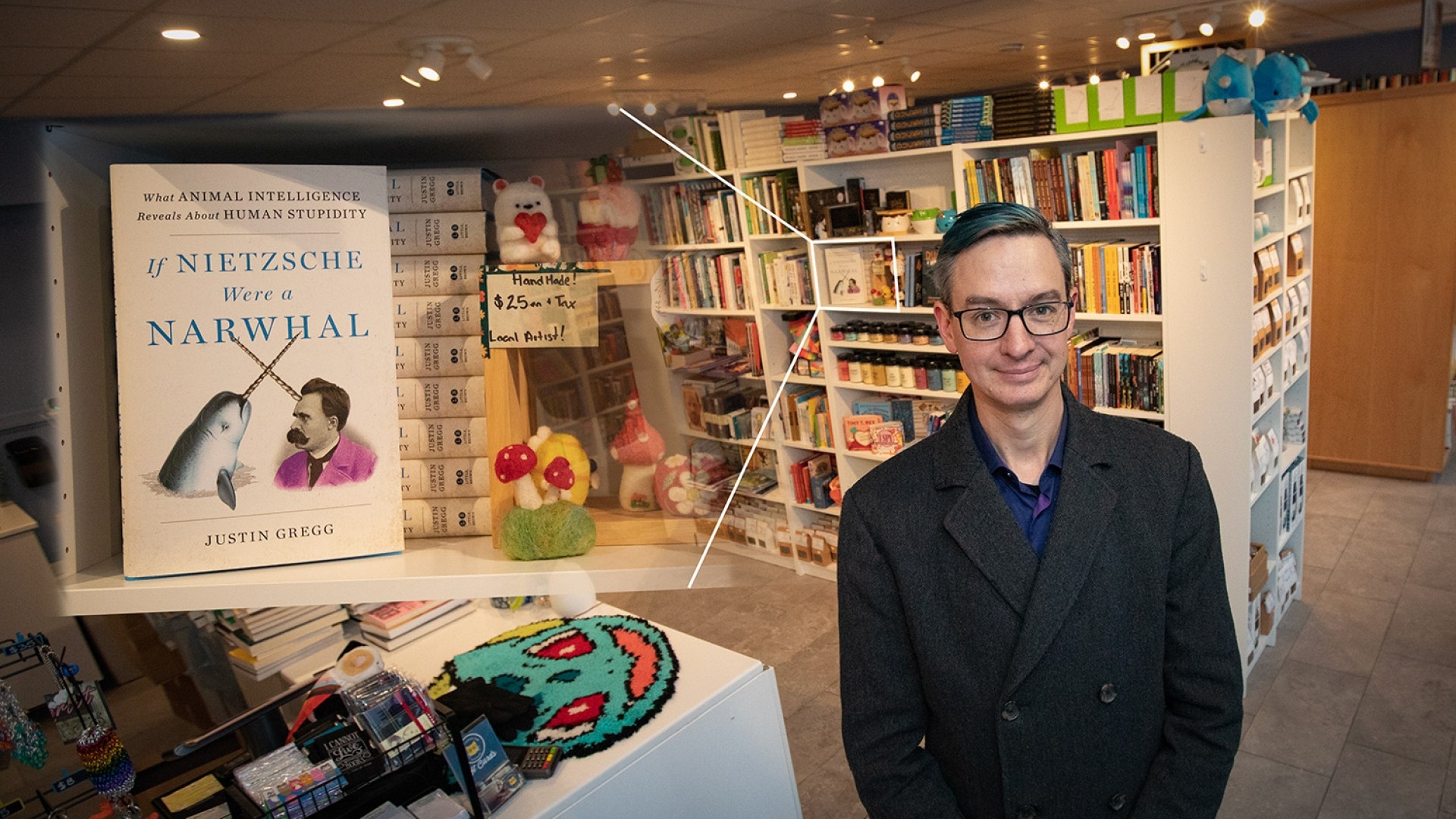
International accolades keep pouring in for Dr. Justin Gregg’s book, If Nietzsche Were a Narwhal: What Animal Intelligence Reveals About Human Stupidity.
First published on August 9th, 2022, the StFX adjunct biology professor’s book, which questions if human intelligence is actually more of a liability than a gift, has garnered reams of rave reviews from major outlets from The New York Times to The Washington Post. More recently released by its UK publishers in January 2023, the book—currently being translated into a dozen languages—continues to draw stellar reviews, including from The New Statesman, The Guardian, The Times, and the Financial Times.
Reviewers have called If Nietzsche Were a Narwhal a hilarious, thrilling book, an absolute must-read, and a book that combines first-rate storytelling with the latest research on animal minds and cognitive psychology.
“A dazzling, delightful read on what animal cognition can teach us about our own mental shortcomings. You won’t just tear through this book in one sitting—you’ll probably want to invite Justin Gregg over for dinner to spend more time inside his brilliant mind. This is one of the best debuts I’ve read in a long time, and I dare you to open it without rethinking some of your basic ideas about intelligence,” Adam Grant, the #1 New York Times bestselling author of Think Again, wrote.
“If Nietzsche Were A Narwhal makes some extraordinary and thought-provoking points. It is not only engagingly written, but its controversial thesis is worth taking seriously… some of the cognitive concepts introduced… are nothing less than brilliant,” says David P. Barash in The Wall Street Journal.
Amy Brady, Scientific America, writes, “A snappy read: it left me wondering why we don't respect signals of intelligence from other species—and more deeply consider how our own intelligence works against us.”
A LOOK AT INTELLIGENCE
“It’s a look at whether human intelligence is a good thing, and looking at what makes it different,” says Dr. Gregg, who teaches a seminar on animal minds at StFX, is a senior research associate with the Dolphin Communication Project, is author of the trade book, Are Dolphins Really Smart? (Oxford University Press) and is a science writer who writes about animal behaviour and cognition.
Humans can be very destructive as a species, he says. In the book, he questions if humans would be better off as narwhals or some other less brainy species, arguing there’s an evolutionary reason why human intelligence isn’t more prevalent in the animal kingdom, noting animal success doesn’t come with the added baggage of destroying themselves and the planet in the process.
Dr. Gregg, who describes the book as accessible nonfiction, written for the general public and the science-curious, says while he is pleasantly surprised by the reaction to the work, he’s not surprised in the sense that people find the subject interesting.
He is surprised by how much attention it’s received. And while it’s a bit bizarre to know so many people will have access, especially as the book is translated into different languages, he says it feels good as that’s the point, to share the idea.
“I was excited,” he says on the reaction. “I got to speak with a lot of interesting people.” He says he’s been interviewed by some of his academic heroes and by a number of people he admires. He’s appeared on major podcasts as well as on national ABC News in the U.S.
Dr. Gregg says what has really resonated with people is that they are drawn to the idea that at the moment there are a lot of problems in the world, from war to climate change, that’s only possible because of the way people think and the nature of their intelligence.
“It’s so potentially catastrophic because of how smart we are.”
Dr. Gregg says he also hopes readers will come away from the book, reanalyzing their relationship with animals, particularly around animal rights and animal welfare.
Dr. Gregg says he would like to thank members of the local community and the local bookstore, The Curious Cat Tea and Books, for all the support and sense of community shown to him with the publication of the book.

